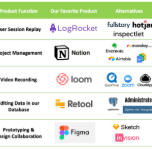Launching a startup is exciting—but also overwhelming. Founders often juggle multiple responsibilities: managing finances, building customer relationships, handling marketing, and optimizing operations. Fortunately, Software as a Service (SaaS) tools have become the backbone of modern startups, offering affordable, scalable, and flexible solutions.
Whether you’re a bootstrapped founder or backed by investors, choosing the right SaaS tools can save time, reduce costs, and help your team focus on growth. In this guide, we’ll explore the top SaaS tools for startups in 2025, categorized by function, to help you build a lean and efficient tech stack.
Why SaaS Tools Are Essential for Startups
SaaS solutions eliminate the need for heavy infrastructure, allowing startups to pay as they grow. Here’s why they’re critical:
- Cost-Effective: No upfront costs for hardware or complex installations.
- Scalable: Pay for only what you use, and scale as your team grows.
- Collaborative: Cloud-based access ensures seamless team collaboration.
- Automatic Updates: Stay ahead with the latest features and security patches.
Top SaaS Tools for Startups
1. Project Management & Collaboration
Managing projects effectively is crucial for startups working with limited resources.
- Trello – A visual project management tool using boards, lists, and cards. Perfect for small teams needing flexibility.
- Asana – Great for tracking workflows, assigning tasks, and monitoring project progress.
- Slack – The go-to team communication tool that reduces email clutter and integrates with other SaaS apps.
📌 Tip: Integrate Slack with Trello or Asana to streamline notifications and improve productivity.
2. Customer Relationship Management (CRM)
Building strong customer relationships is key to long-term growth.
- HubSpot CRM – Free to start, with powerful marketing, sales, and support features. Ideal for growing startups.
- Zoho CRM – Affordable with customizable automation for small businesses.
- Pipedrive – Sales-focused CRM that helps track leads and pipelines effectively.
💡 According to HubSpot, businesses that use CRMs see a 300% increase in lead conversion rates.
3. Marketing & Growth Tools
Marketing is the lifeblood of startups. These SaaS tools help you reach and convert your audience.
- Mailchimp – An all-in-one email marketing platform with automation features.
- Canva – Perfect for creating graphics, social posts, and presentations without design expertise.
- SEMrush – A powerful SEO and digital marketing suite to optimize campaigns and track competitors.
👉 For more strategies, check out our guide on how to use SaaS for marketing.
4. Accounting & Finance Management
Managing cash flow is one of the biggest challenges for startups.
- QuickBooks Online – Easy-to-use accounting software for small businesses.
- FreshBooks – Best for freelancers and service-based startups with simple invoicing needs.
- Xero – Cloud-based accounting that scales with your business and integrates with multiple tools.
📊 A study by Intuit shows that 89% of small business owners say SaaS accounting tools improved financial visibility.
5. Cloud Storage & File Sharing
Startups need secure and accessible storage solutions.
- Google Drive – Free storage with seamless collaboration via Google Workspace.
- Dropbox Business – Secure file sharing with advanced admin controls.
- OneDrive – Integrated with Microsoft 365 for businesses relying on Office apps.
🔗 Related: Read our article on top cloud storage solutions 2025.
6. Customer Support & Helpdesk
Providing excellent customer support sets startups apart.
- Zendesk – A leading helpdesk solution with multichannel support.
- Intercom – Combines live chat, bots, and customer engagement tools.
- Freshdesk – Affordable customer support software with automation.
💬 A report by Salesforce reveals that 78% of customers are more likely to stay loyal to companies offering great support.
7. Analytics & Business Intelligence
Data-driven decisions fuel startup growth.
- Google Analytics 4 – Free and powerful for tracking web traffic and customer behavior.
- Tableau – Best for visualizing complex data insights.
- Mixpanel – Focused on product analytics, ideal for SaaS startups monitoring user engagement.
8. HR & Team Management
Managing people effectively ensures smooth scaling.
- Gusto – Handles payroll, benefits, and HR compliance.
- BambooHR – A people-first HR software with employee self-service tools.
- Deel – Perfect for startups hiring remote teams across the globe.
How to Choose the Right SaaS Tools
Not all startups need the same tools. Consider these factors before deciding:
- Budget: Start with free or affordable options, then upgrade.
- Integration: Choose tools that integrate seamlessly with your current stack.
- Scalability: Pick solutions that grow with your business.
- Ease of Use: A tool is only effective if your team can use it comfortably.
🔗 Learn more in our guide on how to choose SaaS software.

Conclusion
The right SaaS tools can make the difference between a struggling startup and a thriving one. From project management and CRM to marketing and HR, each tool helps reduce manual work, improve efficiency, and scale faster.
As you build your startup’s toolkit, remember:
- Start lean with essential tools.
- Integrate platforms to avoid silos.
- Regularly review and optimize your stack.
By leveraging the top SaaS tools for startups, you’ll be equipped to focus on what matters most—innovating, scaling, and delivering value to your customers.
✅ Next step: Explore our detailed guides on cloud solutions, SaaS marketing strategies, and CRM platforms to design the perfect tech stack for your startup.
